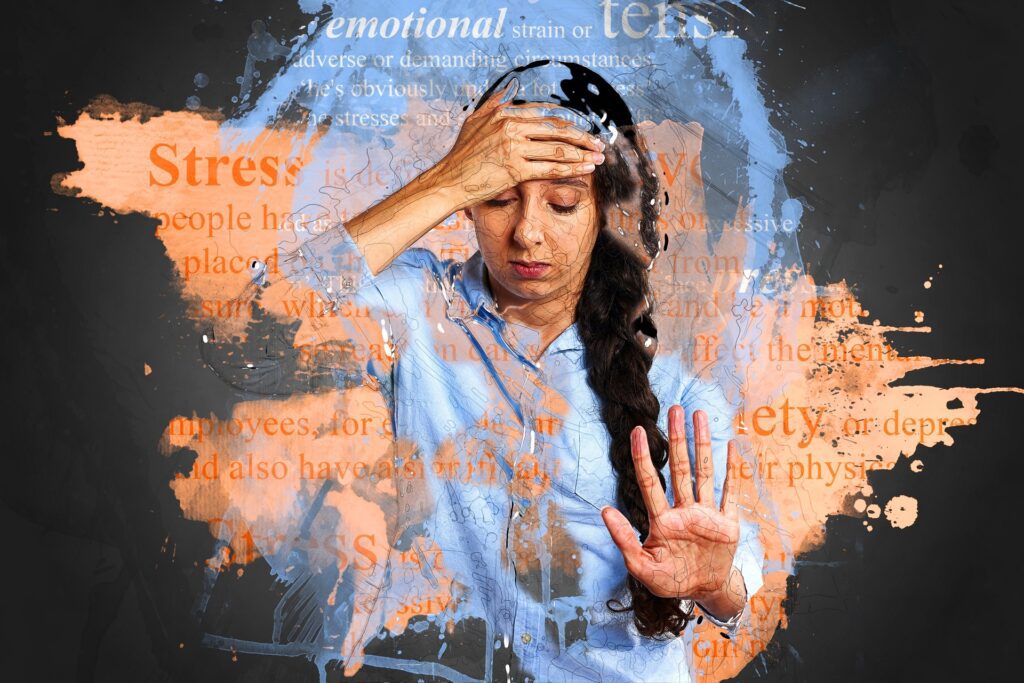Table of Contents

Introduction
Stress Impact our current era of relentless pace and ever-increasing demands, stress has become a virtually inescapable aspect of existence. Whether it stems from the pressures of work, familial responsibilities, or the multitude of social commitments that clutter our calendars, stress is a force that seems to loom over us, waiting to pounce at the slightest provocation. (Stress Impact)
However, understanding the intricate tapestry of stress and its profound impact on our physical well-being is essential for navigating the tumultuous waters of modern life. This blog post aims to dissect the concept of stress, elucidate the physiological maelstrom it unleashes within our bodies, delve into the multifaceted consequences of chronic stress on physical health, and outline a plethora of strategies for effectively managing stress to promote a more balanced and healthful lifestyle.
Understanding Stress: The Body’s Response to Challenge
Stress, at its core, is a physiological and psychological response to any event or situation that necessitates an adaptation or adjustment. It is a double-edged sword, capable of both propelling us to achieve our goals and, in excess, debilitating our mental and physical health. To navigate the complex terrain of stress, it is crucial to distinguish between its various manifestations and understand how it can be both beneficial and detrimental.(Stress Impact)
The Nature of Stress: A Continuum of Experience
Stress can be categorized into three primary types, each with its unique characteristics and implications for our well-being:
1. Acute Stress: This is the most transient form of stress, typically arising from immediate or short-term challenges such as a looming deadline, a tense confrontation, or a sudden, unexpected event. Acute stress can be advantageous, serving as a catalyst for heightened performance and motivation. It is the body’s natural and adaptive response to immediate threats, providing the necessary burst of energy and focus to conquer the task at hand.(Stress Impact)
2. Episodic Stress: Those who frequently find themselves in situations that induce acute stress may experience episodic stress. These individuals often feel overwhelmed by the sheer volume of demands placed upon them, and may struggle to maintain a sense of equilibrium in their daily lives. Episodic stress can stem from a variety of factors, including an overly hectic lifestyle, persistent interpersonal conflicts, or recurring bouts of worry and anxiety.(Stress Impact)
3. Chronic Stress: This insidious form of stress is the most concerning, as it lingers over time, often stemming from persistent and unresolved issues such as financial instability, chronic illness, or a toxic work environment. Chronic stress can wreak havoc on both our mental and physical health, leading to a multitude of ailments and exacerbating pre-existing conditions.


The Yin and Yang of Stress: Eustress and Distress
It is essential to recognize that not all stress is inherently destructive. Eustress, or positive stress, is the invigorating feeling that arises from positive events or challenges that we perceive as within our capacity to handle. It is the exhilaration of starting a new job, the excitement of planning a wedding, or the thrill of competition. This type of stress can drive us to perform better, foster personal growth, and enhance our resilience.(Stress Impact)
Conversely, distress is the negative counterpart of stress, characterized by feelings of anxiety, tension, and overwhelm. It is the kind of stress that wears on us over time, chipping away at our mental and physical health. Distress is the product of stressors that feel unmanageable or overwhelming, such as persistent workplace demands, long-term financial struggles, or unresolved emotional trauma.(Stress Impact)
The Stress Response: A Biological Blueprint for Survival
When faced with a stressful situation, our bodies initiate the “fight-or-flight” response, a biological imperative designed to prepare us for confrontation or escape. This intricate cascade of physiological reactions is triggered by the hypothalamic-pituitary-adrenal (HPA) axis, which prompts the release of stress hormones such as adrenaline and cortisol. These hormones are instrumental in orchestrating the following changes:
– Increased Heart Rate: The heart pumps more blood to essential organs and muscles, preparing the body for action.(Stress Impact)
– Elevated Blood Pressure: This ensures that oxygen and nutrients are delivered swiftly to vital areas.
– Enhanced Alertness: Our senses become sharper, and our brains are primed to respond to potential threats.(Stress Impact)
– Dilated Air Passages: Respiration accelerates to supply the body with more oxygen.
While these responses are advantageous in the short term, allowing us to confront or flee from danger, chronic activation of the fight-or-flight response can have dire consequences for our health. The sustained presence of stress hormones can lead to a cascade of health issues, as the body remains in a perpetual state of high alert.(Stress Impact)


Chronic Stress and Its Physical Toll
Chronic stress wields a heavy hand over our bodily systems, with the potential to disrupt and damage our physical health in profound ways. Here, we explore the far-reaching impact of chronic stress on several key areas of the body:
1. The Cardiovascular System: Chronic stress has been intimately linked with cardiovascular health. The persistent elevation of cortisol and adrenaline can lead to hypertension, increased heart rate, and narrowing of blood vessels. These factors conspire to increase the risk of heart attacks, strokes, and other cardiovascular conditions.(Stress Impact)
2. The Immune System: Chronic stress can compromise the integrity of our immune defenses, making us more susceptible to infections and diseases. Cortisol, the primary stress hormone, suppresses the production of cytokines, which are crucial for coordinating the immune response. This can leave us more vulnerable to illness and prolong our recovery periods.
3. The Digestive System: Stress has a profound effect on the delicate balance of our gastrointestinal tract. It can lead to conditions such as irritable bowel syndrome (IBS), ulcers, and indigestion. Moreover, stress can alter our appetites, leading to overeating or under-eating, which can exacerbate digestive woes.
4. The Musculoskeletal System: Muscular tension is a hallmark of stress. Over time, chronic stress can lead to persistent muscle tension, resulting in pain and discomfort, particularly in the neck, shoulders, and back. This tension can increase the likelihood of injuries and contribute to conditions like tension headaches and migraines.(Stress Impact)
5. The Reproductive System: The intricate dance of hormones that governs our reproductive health is easily disrupted by chronic stress. Women may experience irregular menstrual cycles, increased menstrual pain, and fertility issues, while men can suffer from decreased libido and erectile dysfunction.
6. The Nervous System: Stress can take a heavy toll on our nervous system, contributing to anxiety, depression, and other mood disorders. Additionally, it can disrupt sleep patterns, leading to insomnia and further stress-induced woes.(Stress Impact)6. The Nervous System: Stress can take a heavy toll on our nervous system, contributing to anxiety, depression, and other mood disorders. Additionally, it can disrupt sleep patterns, leading to insomnia and further stress-induced woes.
The Stress-Health Nexus: Chronic Stress and Specific Conditions
Chronic stress is not merely a nuisance but a significant player in the onset and exacerbation of numerous health conditions. Among the most concerning are:(Stress Impact)
– Cardiovascular Disease: Research has established a clear link between chronic stress and the development of high blood pressure and heart disease. Stress can lead to unhealthy lifestyle choices, such as poor diet and sedentary behavior, which further contribute to cardiovascular risks.
– Diabetes: Chronic stress can impact blood sugar levels and insulin sensitivity, making it a precursor to the onset of type 2 diabetes. The hormonal fluctuations triggered by stress can also lead to detrimental eating habits, compounding the risk.
– Asthma: Stress is known to exacerbate asthma symptoms by triggering inflammation in the airways and increasing sensitivity to allergens. For asthma sufferers, managing stress is an essential component of disease management.(Stress Impact)
– Autoimmune Disorders: Conditions such as rheumatoid arthritis and lupus can be exacerbated by chronic stress. Stress can lead to increased inflammation and disrupt the immune system’s ability to regulate itself properly.(Stress Impact)
Mastering the Art of Stress Management
The good news is that we are not helpless in the face of stress. By implementing strategies to mitigate its effects, we can reclaim control over our lives and bolster our physical health. Here are some effective methods for managing stress:
1. Lifestyle Adjustments: The Foundation of Stress Reduction
– Regular Exercise: Engaging in physical activity is a potent antidote to stress. Exercise has been shown to reduce cortisol levels, improve mood, and enhance sleep quality. Aim for at least 150 minutes of moderate aerobic activity or 75 minutes of vigorous aerobic activity weekly, supplemented by strength training.
– Healthy Eating Habits: A balanced diet is crucial for maintaining optimal health and combating stress. Fill your plate with a rainbow of fruits and vegetables, lean proteins, and whole grains, while limiting caffeine and sugary foods that can exacerbate anxiety.(Stress Impact)
– Adequate Sleep: Prioritizing restorative sleep is vital for stress management. Aim for 7-9 hours of sleep each night, and establish a consistent sleep routine to support your body’s natural rhythms.
2. Relaxation Techniques: The Mind-Body Connection
– Deep Breathing Exercises: Deep, controlled breathing can activate the body’s relaxation response, helping to reduce stress and anxiety. Inhale deeply through the nose, hold the breath for several seconds, and exhale slowly through the mouth.(Stress Impact)
– Meditation and Mindfulness: Practicing mindfulness through meditation can help us remain present and reduce stress. These practices encourage relaxation and provide a much-needed respite from the incessant chatter of our minds.(Stress Impact)
– Yoga and Tai Chi: These ancient disciplines blend physical movement with mindfulness, offering a holistic approach to stress relief. They promote flexibility, strength, and balance, both physically and mentally.
3. The Power of Social Support
– Building and Maintaining Strong Relationships: Having a solid support network can significantly buffer the effects of stress. Turn to friends and family to share your feelings and gain new perspectives on your challenges.
– Seeking Assistance from Loved Ones: When stress becomes unmanageable, do not be afraid to reach out for help. Discussing your concerns with those closest to you can provide relief and new coping strategies.(Stress Impact)
– Joining Support Groups: Connecting with individuals facing similar challenges can foster a sense of belonging and understanding, offering invaluable emotional support.
4. Professional Intervention: When Stress Becomes Overwhelming
– Therapy and Counseling: For those grappling with severe or persistent stress, professional help can be life-changing. Therapists and counselors are equipped with the tools to guide you through the tumultuous emotional landscape.(Stress Impact)
– Medication: In some instances, medication may be warranted to manage stress-related symptoms. Consult with your healthcare provider to determine if medication is a suitable option for you.
– Stress Management Programs: Many organizations provide structured stress management programs that can offer practical skills and techniques for coping with stress effectively.
Conclusion
Stress is a fact of life, but it does not have to define us. By recognizing the signs of chronic stress and taking proactive steps to manage it, we can mitigate its detrimental effects on our physical health. Employing a combination of lifestyle changes, relaxation techniques, social support, and professional help, we can cultivate a life of balance and well-being. Remember, stress management is a journey, not a destination. Commit to making small, incremental changes, and you will find that, over time, the burden of stress becomes lighter and your resilience stronger. With intentional effort and a supportive environment, you can not only survive in our fast-paced world but thrive within it.